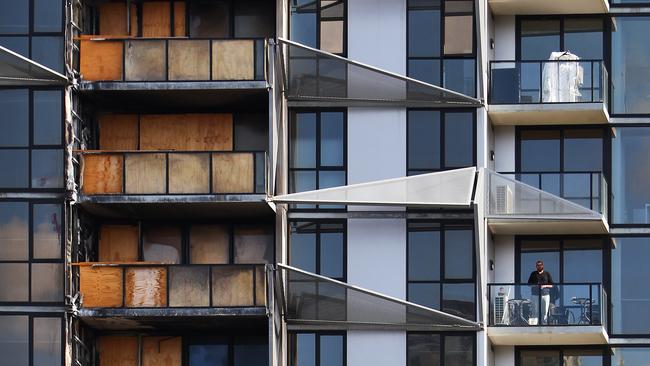Victorian Building Authority demands urgent safety works on buildings with dangerous cladding
The owners of a dozen buildings have been ordered to carry out urgent safety upgrades to prevent a Grenfell Tower-style tragedy in Victoria.
VIC News
Don't miss out on the headlines from VIC News. Followed categories will be added to My News.
The owners of a dozen buildings have been ordered to conduct urgent safety upgrades to prevent a Grenfell Tower-style tragedy in Victoria.
Teams of engineers, surveyors and firefighters have been examining 1369 buildings with potentially dangerous cladding after June 2017’s London disaster, which killed 72 people.
New figures from the Victorian Cladding Taskforce show that it is likely that cladding will have to be removed from many of the 44 buildings that have been deemed to be at the greatest risk.
HOSPITALS ON DODGY CLADDING HIT-LIST
FIRE SAFETY EXPERTS WARN ON DEVELOPERS
The majority of at-risk buildings are two or three storeys high, have only one exit, and inadequate fire safety measures.
Owners of 12 buildings have been issued emergency orders to conduct immediate upgrades, such as putting in fire-detection and warning systems and sprinklers, and removing potential ignition sources.
The Victorian Building Authority has also handed out about 150 “show cause” notices to owners of buildings that have potentially combustible cladding. They will be required to explain why their buildings are safe with the cladding — explanations the VBA and local councils can challenge.
Expert teams ranked another 232 buildings as being at “high risk”, and 228 buildings as being at “moderate risk”.

A separate audit of about 4700 buildings owned and leased by the state government identified 384 buildings with potentially combustible cladding, 21 of which were deemed to be the most at risk.
“These are being dealt with as a matter of urgency by government, and longer-term rectification, involving removal of some or all of the cladding, may be needed,” the taskforce’s latest report said.
After the statewide audit, the taskforce concluded: “Dangerous materials are widely used on buildings throughout Victoria, a finding that is consistent with inquiries carried out interstate and internationally.”
Last year, Planning Minister Richard Wynne moved to ban from all multi-storey buildings cladding of expanded polystyrene and of aluminium panels with a polyethylene core of more than 30 per cent.
Building owners and residents have been grappling with who should pay to replace cladding. New laws brought in by the government allow voluntary loan agreements, in which payments are made via council rates.
The VBA has been given the power to carry out “destructive testing” of building materials used in cladding that is suspected of being non-compliant. This is because the materials can be difficult to identify by sight.
Registered builders that repeatedly disregard public health and safety concerns can immediately be suspended.



